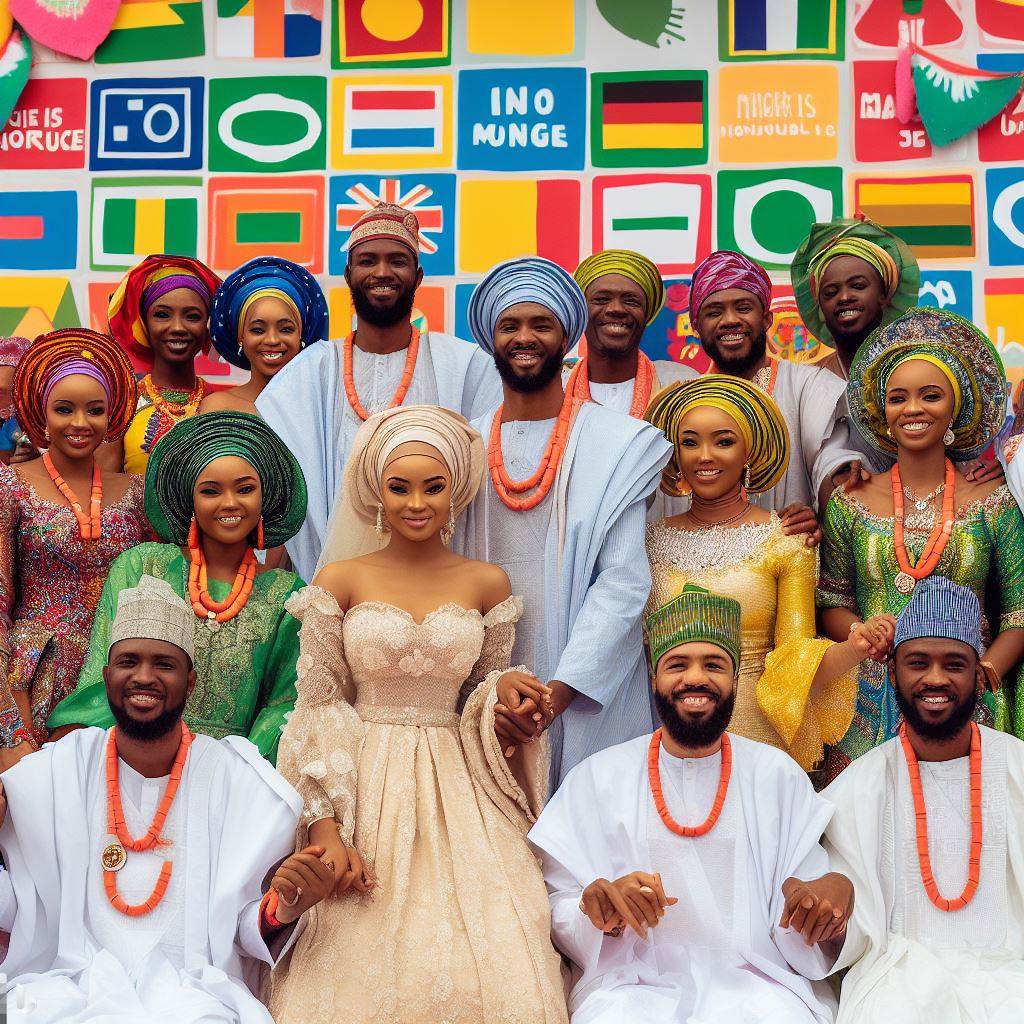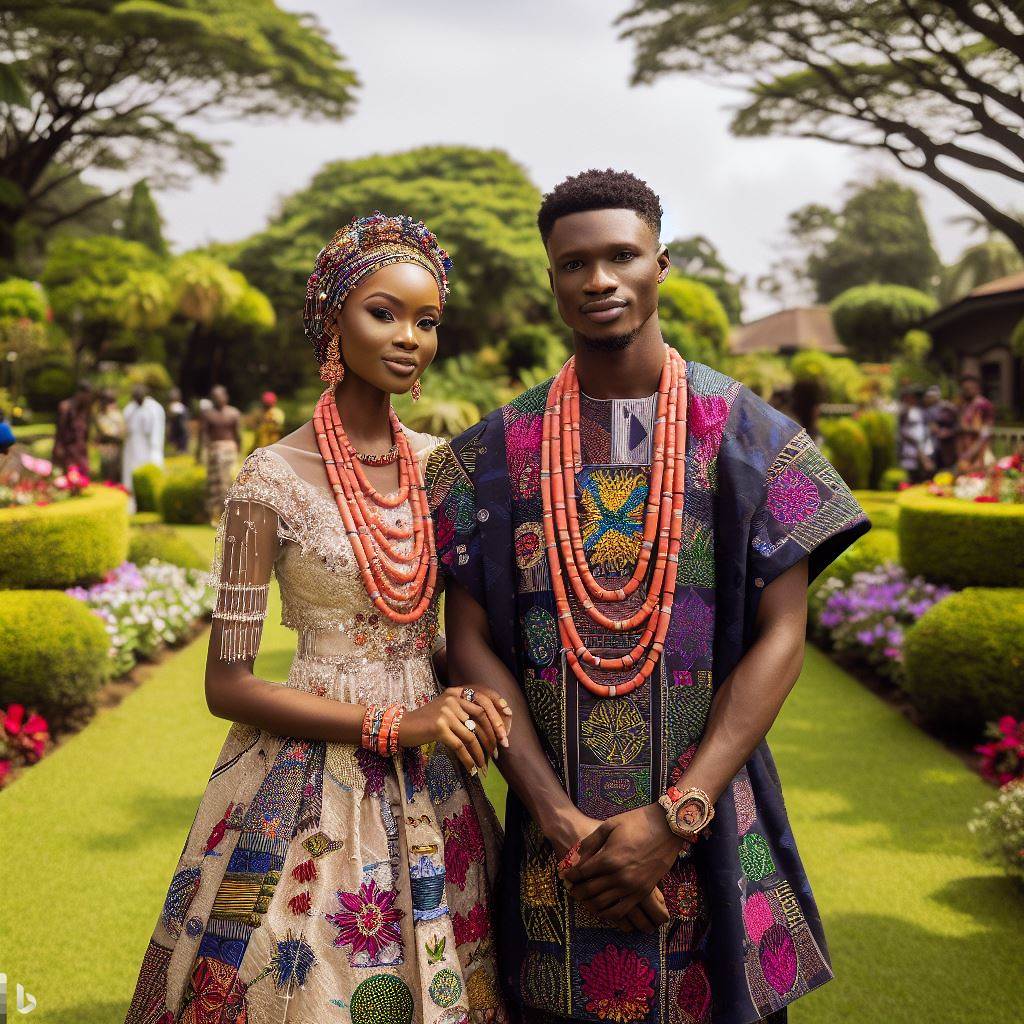Introduction
With its deep-rooted traditions, marriage in Nigeria has profound socio-economic implications.
Marriage, an institution joining two individuals in a legal and social agreement, holds immense significance in Nigerian culture.
Definition of marriage
Marriage is a legally recognized union between a man and a woman, bound by love, commitment, and shared responsibility.
Importance of marriage in Nigerian culture
In Nigerian culture, marriage is seen as a sacred bond that brings together families, strengthens social ties, and ensures the continuation of lineage.
Marriage is a revered institution in Nigeria, with significant socio-economic implications.
In Nigeria, marriage extends beyond personal happiness and plays a crucial role in the country’s socio-economic fabric.
It goes beyond the union of two individuals; it represents a connection of families, clans, and communities.
In Nigerian society, a successful marriage confirms a person’s social status, integrity, and character.
Marriage fosters social cohesion, as it promotes communal support, cooperation, and collective responsibility.
Economically, marriage is a catalyst for wealth redistribution, as it often involves dowries, traditional ceremonies, and financial exchanges.
In Nigeria, marriage acts as a social safety net, providing emotional, financial, and physical security for individuals and their offspring.
Furthermore, marriage serves as a foundation for entrepreneurship, as couples often establish joint businesses and contribute to economic growth.
In essence , marriage holds immense significance in Nigerian culture, impacting various aspects of society.
The socio-economic implications are evident, as marriage strengthens social bonds, promotes wealth redistribution, and fosters economic development.
Read: Marriage is Honourable: Understanding its Roots in Nigerian Culture
Socio-Economic Implications of Marriage in Nigeria
In Nigeria, marriage is widely regarded as honorable, and it has significant socio-economic implications for individuals and society as a whole.
Role of Marriage in Economic Stability
In Nigeria, marriage plays a vital role in contributing to economic stability within individuals and society as a whole.
When individuals get married, new households are formed, which leads to stability in various economic aspects.
These include joint income and financial resources, which enhance financial security and stability.
Entrepreneurship and business opportunities
Moreover, marriage acts as a catalyst for entrepreneurship and business opportunities in Nigeria.
Family support plays a fundamental role in starting businesses, and married individuals often rely on their families for financial assistance and guidance.
This support enables them to pursue their entrepreneurial aspirations and contribute to economic growth.
Furthermore, marriage provides networking opportunities and business connections through family relationships and associations.
Married individuals often have access to a wide range of connections, which can be beneficial for business ventures.
These connections help in establishing partnerships, securing investments, and expanding networks, ultimately leading to increased business opportunities and growth.
Social mobility and status
Additionally, marriage can significantly impact social mobility and status in Nigeria.
It serves as a means of upward social mobility, as it allows individuals to form alliances and gain access to resources and opportunities.
Marriage opens doors to social interactions and connections that may not have been accessible otherwise.
In Nigerian society, being married often brings prestige, recognition, and respect within the community.
Married individuals are seen as responsible and successful members of society, which enhances their social status.
This recognition and respect can have positive implications for career advancements, social interactions, and overall well-being.
In fact, marriage is considered honourable in Nigeria, and it has significant socio-economic implications.
It contributes to economic stability through the formation of new households and the sharing of income and financial resources.
Marriage also creates opportunities for entrepreneurship and business development through family support and networking.
Furthermore, it plays a role in social mobility and status, allowing individuals to gain access to resources and recognition within the community.
Understanding the socio-economic implications of marriage is crucial for individuals, policymakers, and society as a whole.
Read: Nigerian Traditional Wedding Wishes for the Newlyweds
Learn More: Tips for Honouring Your Spouse in Daily Nigerian Family Life
Challenges and problems in Nigerian marriages
High divorce rates
Nigerian marriages face various challenges and problems that have significant socio-economic implications. One of the most pressing issues is the high divorce rates experienced within the country.
This is mainly attributed to the lack of compatibility and communication between spouses.
When couples are unable to effectively communicate and understand each other’s needs, it often leads to tension and conflict, ultimately resulting in divorce.
Additionally, infidelity and extramarital affairs are common reasons for the breakdown of marriages in Nigeria, highlighting a lack of trust and loyalty within relationships.
Economic strain and financial disagreement
Another major challenge faced by Nigerian marriages is economic strain and financial disagreements.
Job loss and financial instability often put immense pressure on couples, leading to increased stress levels and marital conflicts.
The inability to meet financial obligations and differing views on financial responsibilities can strain relationships, causing discord and dissatisfaction.
Gender inequality and traditional gender roles
Gender inequality and traditional gender roles also pose significant challenges in Nigerian marriages.
Women often face limited opportunities for personal and professional growth, leading to feelings of dissatisfaction and resentment within marriages.
Patriarchal norms and expectations further reinforce the traditional roles assigned to men and women, placing additional pressure and restrictions on both genders.
To address these challenges, it is crucial for Nigerian society to promote compatibility and effective communication within marriages.
Couples should be encouraged to seek professional help, such as marriage counseling, to improve their communication skills and resolve conflicts amicably.
Furthermore, efforts should be made to promote gender equality and empower women by providing them with equal opportunities for education and employment.
Challenging patriarchal norms and expectations can create a more balanced and harmonious environment within marriages.
Essentially, the challenges and problems within Nigerian marriages, including high divorce rates, economic strain, financial disagreements, and gender inequality, have profound socio-economic implications.
By addressing these issues and promoting healthier and more equal partnerships, Nigerian society can experience improved marital dynamics and overall well-being.
Read: Biblical Insights: Why ‘Marriage is Honourable’ in Christian Beliefs

Initiatives and strategies for strengthening marriages in Nigeria
Marriage is a sacred institution that holds great importance in Nigerian society, not only from a cultural and religious perspective but also from a socio-economic standpoint.
When marriages are strong and thriving, they contribute positively to the overall development and well-being of individuals and the nation as a whole.
However, it is crucial to acknowledge the challenges faced by marriages in Nigeria and explore potential initiatives and strategies for strengthening them.
Pre-marital counseling and education
One effective initiative is to promote pre-marital counseling and education programs.
These programs can greatly benefit couples by equipping them with essential communication and conflict resolution skills.
By addressing potential challenges and providing tools to navigate them, couples can establish a strong foundation for their marriage.
Pre-marital counseling can also help couples to understand the realities of marriage, managing expectations and working together to overcome obstacles.
Economic empowerment programs
Another crucial aspect of strengthening marriages in Nigeria is through economic empowerment programs.
These programs aim to provide skill training and employment opportunities to individuals, particularly women.
By equipping women with marketable skills and access to employment, they are empowered to contribute financially to their households.
Additionally, promoting financial literacy and savings culture ensures that couples have the necessary resources to meet their needs and strengthen their economic stability.
Gender equality advocacy and empowerment
Addressing gender inequalities and advocating for gender equality is vital in strengthening marriages in Nigeria.
Challenging traditional gender roles and stereotypes that limit the opportunities and rights of women is essential.
By promoting equal opportunities for both genders, marriages can be built on a foundation of mutual respect and collaboration.
Empowering women to exercise their rights and make decisions in marriage leads to healthier and more fulfilling relationships.
Basically, marriage is indeed honorable and has significant socio-economic implications in Nigeria.
To strengthen marriages, it is important to implement initiatives such as pre-marital counseling and education programs, economic empowerment programs, and gender equality advocacy.
By investing in these strategies, the Nigerian society can ensure that marriages are fortified, leading to the overall development and well-being of individuals and the nation.
Read: Fusion Wishes: Combining Nigerian Cultures in Messages
Conclusion
Recap of key points
Throughout this chapter, we have explored the socio-economic implications of marriage in Nigeria.
The importance of marriage for socio-economic development
Marriage plays a crucial role in the development of any society, including Nigeria.
It provides stability, enhances productivity, and contributes to economic growth.
Encouraging efforts in strengthening marriages and addressing challenges in Nigeria
It is imperative that we focus on strengthening marriages in Nigeria.
This can be done through promoting communication, trust, and mutual respect, as well as addressing challenges such as domestic violence, financial constraints, and societal pressures.
Marriage is an honorable institution that brings about numerous socio-economic benefits.
It is vital for individuals, families, communities, and the country as a whole to prioritize efforts in building strong and healthy marriages.
By doing so, we can create a more prosperous and equitable society in Nigeria.




